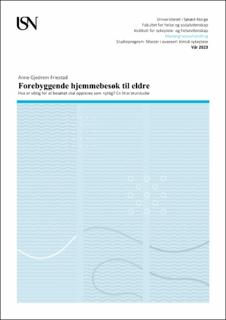| dc.contributor.advisor | Tøien, Mette | |
| dc.contributor.author | Friestad, Anne Gjedrem | |
| dc.date.accessioned | 2023-08-30T16:42:42Z | |
| dc.date.available | 2023-08-30T16:42:42Z | |
| dc.date.issued | 2023 | |
| dc.identifier | no.usn:wiseflow:6842120:54669066 | |
| dc.identifier.uri | https://hdl.handle.net/11250/3086505 | |
| dc.description.abstract | Hensikt
Hensikten med denne studien var å identifisere hva eldre mente var viktig for at forebyggende hjemmebesøk skulle oppleves som nyttig.
Bakgrunn
Det blir stadig flere eldre i befolkningen, og behovet for helse- og omsorgstjenester vil øke framover. Samtidig blir det færre yrkesaktive til å ta seg av de som trenger helsetjenester. Fokuset på forebyggende helsearbeid er derfor økende, og forebyggende hjemmebesøk til eldre er et tiltak som er ønsket av myndighetene for å øke eldres evne til å bo hjemme lengst mulig, og dermed utsette behov for helsetjenester. Det er foreløpig ingen standardisert modell for hvordan forebyggende hjemmebesøk til eldre skal gjøres, og det tilbys heller ikke i alle landets kommuner.
Metode
Jeg har gjort en litteraturstudie av kvalitativ forskning på eldres erfaring med forebyggende hjemmebesøk. Resultatene i hver artikkel ble analysert med tematisk analyse etter Aveyards beskrivelse av metoden.
Resultater
Det var to hovedtemaer som pekte seg ut som resultater av denne studien. Det som var viktigst for de eldre for å oppleve nytte av forebyggende hjemmebesøk, var det å ha en kontaktperson de hadde tillit til. Som en del av dette kom det fram at de fant det nyttig å vite hvem de skulle kontakte ved behov, at de hadde en kunnskapsrik samtalepartner de hadde tillit til, og at de ble sett og fulgt opp. I tillegg var det veldig viktig at besøket var tilpasset den enkeltes behov. Dette innebar at de kunne få samtale om helse, sykdom og forebygging, at de fikk støtte til å opprettholde mestring og selvstendighet, at de fikk informasjon om rettigheter og muligheter og at de fikk praktisk hjelp til det de trengte.
Konklusjon
Det viktigste for at eldre skulle oppleve forbyggende hjemmebesøk som nyttig var at de fikk en kontaktperson de hadde tillit til, og at besøket ar tilpasset dem og deres behov. | |
| dc.description.abstract | Aim
The aim of this study was to identify what the elderly thought was important for preventive home visits to be perceived as useful.
Background
There is an increasing number of elderly people in the population, and the need for healthcare services will increase in the future. At the same time, there will be fewer working people to care for those who need health services. The focus on preventive health work is therefore increasing, and preventive home visits to the elderly is desired by the authorities to increase the elderly's ability to live at home as long as possible and thus postpone the need for health services. There is currently no standardized model for how preventive home visits to the elderly should be carried out, nor is it offered in all the country's municipalities.
Method
I have conducted a literature review on qualitative research on older people's experience of preventive home visits. The results in each article were analyzed with thematic analysis according to Aveyard's description of the method.
Results
There were two main themes that stood out as the results of this study. What was most important for the elderly to experience benefit from preventive home visits was having a contact person they trusted. As part of this, it emerged that they found it useful to know who to contact when needed, that they had a knowledgeable interlocutor they trusted, and that they were seen and followed up. In addition, it was very important that the visit was adapted to the individual's needs. This meant that they could have conversations about health, illness and prevention, that they received support to maintain coping and independence, that they received information about their rights and opportunities, and that they received practical help with what they needed.
Conclusion
The most important thing for the elderly to find preventive home visits useful was that they were given a contact person they trusted, and that the visit was adapted to them and their needs. | |
| dc.language | nob | |
| dc.publisher | University of South-Eastern Norway | |
| dc.title | Forebyggende hjemmebesøk til eldre. Hva er viktig for at besøket skal oppleves som nyttig? En litteraturstudie | |
| dc.type | Master thesis | |
